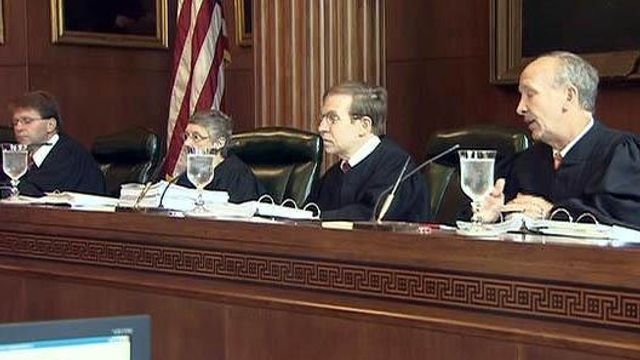Supreme Court: Using highway money to balance budget was illegal
A divided North Carolina Supreme Court on Friday let stand an earlier ruling that found shifting money from special funds to help balance the state budget to be unconstitutional.
Posted — UpdatedThe ruling doesn't carry the weight of legal precedent, but it could impact budget negotiations next year, when North Carolina faces a projected $3 billion deficit. It also doesn't preclude lawsuits involving other recent shifts of funds to cover state deficits.
The case stems from former Gov. Mike Easley's decision in 2002 to raid various funds for $1 billion to help cover a mounting deficit. Included in those funds was $80 million from the Highway Trust Fund.
Two men who helped create the Highway Trust Fund in the late 1980s, former Transportation Secretary Jim Harrington and former state Sen. W.D. Goldston, an Alamance County Democrat, sued over the move, saying money raised through gas taxes that goes into the trust fund is earmarked for specific highway projects.
A Wake County judge dismissed the case two years ago, ruling that Easley is constitutionally required to maintain a balanced budget, so he had the authority to use highway money in the face of a deficit.
A divided Court of Appeals overturned that decision last fall, ruling that Easley needed legislative approval to transfer money to the General Fund.
The Supreme Court split 3-3 in its decision, with Associate Justice Patricia Timmons-Goodson recusing herself from consideration of the case because she had heard it as a member of the Court of Appeals. The split leaves the Court of Appeals ruling intact.
The appellate ruling doesn't carry the weight of a legal precedent in the state – it applies only to the Easley case – so lawsuits over other money shifts could be decided differently in the future.
“It is a wash. It is basically no decision,” said former Chief Justice Burley Mitchell, who argued Easley's case before the Supreme Court.
A lawyer for Harrington and Goldston argued, however, that the ruling will make governors think twice before taking money that the legislature specifically has set aside for a dedicated purpose.
“The governor cannot just come in and willy-nilly siphon from one account to fill out another, said Jeanette Doran of the North Carolina Institute for Constitutional Law.
Gov. Beverly Perdue twice took money from special funds last year to help pay state bills amid a deficit, including the lottery reserve fund, the Clean Water Trust Fund and the public school building and textbook funds.
Her office issued a statement Friday saying governors should be able to move money to balance the budget.
"The executive branch has believed all along that governors have the duty under the state constitution to take the steps necessary to address an economic crisis and balance the budget," Perdue spokesman Mark Johnson said. "The primary commitment to the people of this state is that we have a balanced budget, and the Office of the Governor needs all of the tools available to make that happen.”
• Credits
Copyright 2024 by WRAL.com and the Associated Press. All rights reserved. This material may not be published, broadcast, rewritten or redistributed.






